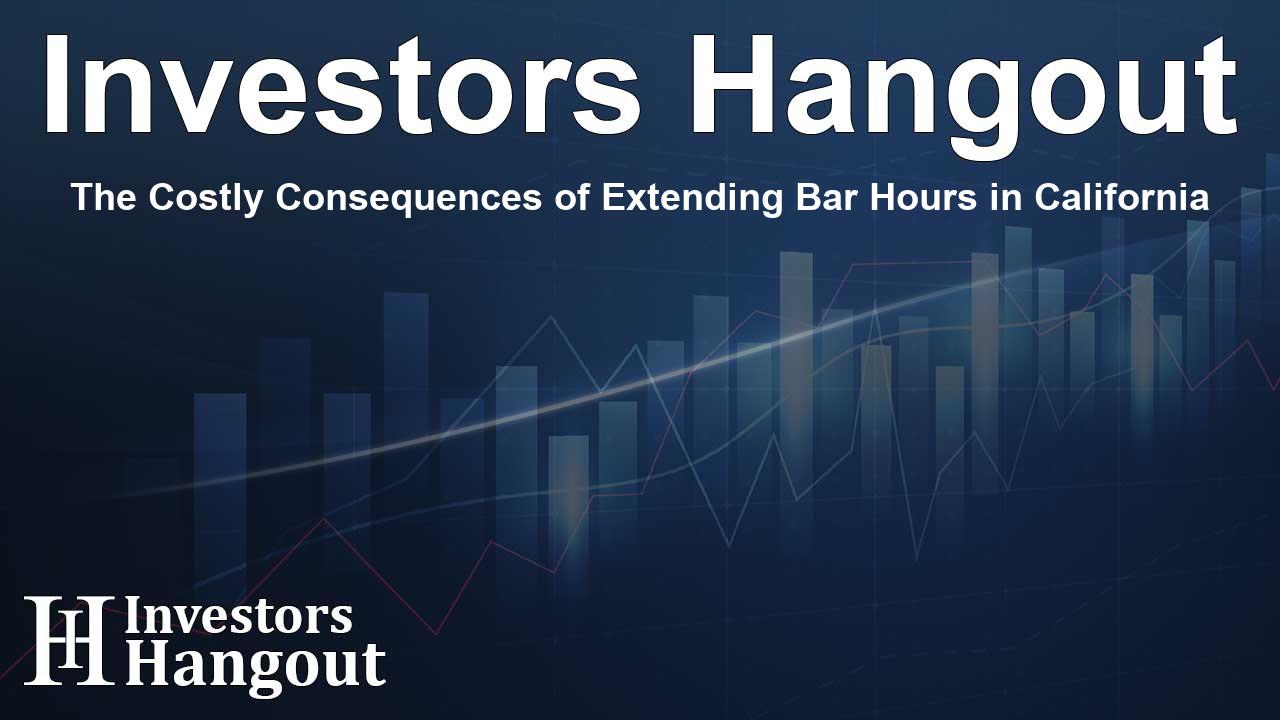The Costly Consequences of Extending Bar Hours in California

High Stakes: The Economic Implications of Extended Bar Hours in California
As discussions around bar hours heat up, California finds itself at a crossroads regarding public health and safety. The proposed Assembly Bill 342 has ignited a fervent debate over the wisdom of allowing bars to serve alcohol until 4 A.M. Although some argue it could boost local economies, a recent analysis suggests that the cumulative costs associated with later last calls could spiral beyond $2 billion over five years, especially in relation to public safety and health.
The Financial Burden: What Does the Data Say?
A report from Alcohol Justice underscores the severity of the financial impact linked to extending bar hours. The substantial costs arise from increased law enforcement needs, emergency services, and the fallout from accidents and injuries. According to the findings, cities could face overwhelming financial strain, especially in locales that allow extended drinking hours.
Concerns from Health Officials and Advocates
Health officials are vocal about their apprehensions regarding the potential harm of extended bar hours. Raul Verdugo, Director of Advocacy for Alcohol Justice, illustrates the disproportionate advantage that bars could gain versus the community's welfare. He emphasizes that while a few establishments might see benefits, the adverse effects, including increased hospitalizations and crime, would burden everyone, creating a widespread negative impact.
Public Health Evidence Against Early Morning Drinking
Kat DeBurgh, Executive Director of the Health Officers Association, pointedly states that AB 342 overlooks significant public health data indicating that later last call times correlate with higher injury and mortality rates related to alcohol. Reports have shown a striking 70% increase in alcohol-related fatalities over recent years. DeBurgh urges legislators to prioritize community health over business interests, stressing the need to reject this bill.
Community Impact: Extending Last Call Zones
The bill, intended to benefit San Francisco, potentially opens up privileges for any city in California to create weekend zones for 4 A.M. last calls. This poses risks not just locally, as alcohol-related incidents often spill over into nearby communities, resulting in a larger geographical impact.
Research Findings on Alcohol-Related Incidents
Numerous studies, including a notable one involving Ventura County, reveal disturbing trends regarding intoxicated drivers traveling significant distances before being apprehended. Additional research from New York indicates that areas adjacent to jurisdictions with extended last call times see an uptick in DUI arrests. Meanwhile, analysis of freeway accident data in the San Francisco Bay Area reveals a shocking 50% to 120% increase in fatal incidents during specific hours. These statistics underscore the wider ramifications of relaxed drinking regulations.
The Long-Term Economic Consequences
The analysis by Alcohol Justice appears to expand upon a landmark 2019 study that highlighted the significant costs per extra drink sold if longer hours were implemented. Adjusted for inflation and focused on weekend mornings, this thorough analysis suggests that the costs of extending last call could reach nearly $376 million per year, or over $2 billion in total across five years. The implications of this financial burden extend particularly to densely populated cities. San Francisco alone could see costs exceeding $27 million yearly, leading to budget gaps that strain critical city services.
Warnings from Researchers
Carson Benowitz-Fredericks, Research Director at Alcohol Justice, warns that attempts to transform city centers into party districts will essentially redirect funds away from essential services like public transportation and housing—all of which contribute to a city's livability.
Call to Action: Standing Against AB 342
As concerns mount, Raul Verdugo reiterates that while the dangers and risks associated with later last calls are already well-known, the economic ramifications reveal another layer of urgency. His call resonates with many: the California legislature must uphold sensible regulations governing alcohol service hours to safeguard public welfare.
Frequently Asked Questions
What is Assembly Bill 342 about?
AB 342 proposes extending last call times for bars to 4 A.M., allowing cities to create weekend zones for late alcohol service.
What financial impact could extending bar hours have?
The financial burden from extending hours could exceed $2 billion over five years, primarily due to increased costs in emergency services and law enforcement.
What are the public health implications of longer bar hours?
Health officials warn that extended hours can lead to more injuries, hospitalizations, and fatalities related to alcohol consumption, affecting overall community health.
Why are neighboring communities concerned?
Research indicates that issues such as drunk driving and alcohol-related harm can spill over into neighboring areas, affecting cities close to those extending bar hours.
What do advocates suggest as a response?
Advocates urge the California legislature to prioritize community health and public safety by rejecting AB 342 and maintaining reasonable last call regulations.
About The Author
Contact Kelly Martin privately here. Or send an email with ATTN: Kelly Martin as the subject to contact@investorshangout.com.
About Investors Hangout
Investors Hangout is a leading online stock forum for financial discussion and learning, offering a wide range of free tools and resources. It draws in traders of all levels, who exchange market knowledge, investigate trading tactics, and keep an eye on industry developments in real time. Featuring financial articles, stock message boards, quotes, charts, company profiles, and live news updates. Through cooperative learning and a wealth of informational resources, it helps users from novices creating their first portfolios to experts honing their techniques. Join Investors Hangout today: https://investorshangout.com/
The content of this article is based on factual, publicly available information and does not represent legal, financial, or investment advice. Investors Hangout does not offer financial advice, and the author is not a licensed financial advisor. Consult a qualified advisor before making any financial or investment decisions based on this article. This article should not be considered advice to purchase, sell, or hold any securities or other investments. If any of the material provided here is inaccurate, please contact us for corrections.
